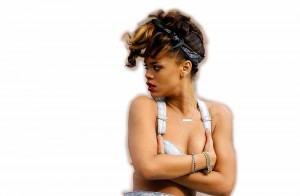Rihanna revitalizes tired musical style
Since attaining stardom in 2005 and 2006 with songs such as “Pon De Replay” and “S.O.S.,” Rihanna has been shifting her musical style and image away from the Barbados island girl toward a more explicit and grown up style.
This new provocative direction, however, did not stop her success; on her last two albums, Rihanna has spawned an incredible seven singles in the Billboard Top 10. From this, it is quite clear where the expectations for Talk That Talk are set. Even with the bar set so high, Rihanna continues to deliver hits.
Musically, Talk That Talk can almost be separated into three categories or genres: techno, pop and hip-hop.
The two techno songs on the album, “Where Have You Been” and “We Found Love,” were assisted in production and writing by the popular DJ Calvin Harris. “Where Have You Been” features synthesized breakdowns and drops worthy of playing in any club, while keeping the pre-choruses calm with acoustic guitar. Unfortunately, the song’s beat easily drowns out Rihanna’s vocals, but that doesn’t take away from the song’s main purpose — to get you dancing.
The lead single, “We Found Love,” contains a similar vivacious energy as it exemplifies the perfect fusion of pop and dance music. An extremely catchy beat and chorus will have this song stuck in your head right away, and the verses’ melodies filled with high notes mesh seamlessly with the beat. Together, these components create yet another number one smash hit for Rihanna in countries around the world.
In contrast, Talk That Talk’s purely pop songs, including “Drunk On Love,” are extremely generic and disappointing. The beat sounds like your regular recycled pop number, with little creativity. Also, there’s no sense that Rihanna brings anything special to the track, making the songs seem like those from your average pop album instead of something unique.
While her energetic pop numbers are flawed, her pop ballads are considerably solid. “We All Want Love” brings the best out of Rihanna vocally, letting her voice shine over a simple beat full of spacious kick drums and spacey guitar.
The final track of the album also brings a similarly strong performance from Rihanna. “Farewell,” produced by Alex da Kid — who also worked with Rihanna on “Love the Way You Lie” — tells the story of someone she cares about having to leave to find a better life for himself. Though it likely won’t be as big of a hit, the emotions of the song will definitely connect with listeners.
Of all of the music on Talk That Talk, however, Rihanna seems to be at her best when bringing the hip-hop style to her songs. This is most noticeable on the title track, “Talk That Talk,” featuring hip-hop icon Jay-Z to start off the song. Consistent hit-producers StarGate lay down a synth-based mid-tempo beat, over which Rihanna and Hova attempt to recreate the hit-song magic found on their classic jam “Umbrella.” And it sounds like they got pretty close.
“Roc Me Out” and “Cockiness (Love It)” are likely the album’s most hip-hop sounding tracks, both of which are sexually-driven and have a darker sound to them. “Roc Me Out,” however, is better on all fronts. Its mid-tempo synthesizer bass and hard-hitting drumbeat are much easier to listen to mixed with Rihanna’s forceful singing, while “Cockiness (Love It)” and its overuse of various vocal samples and 808 kick drums gets very repetitive very quickly. And hearing Rihanna tell you to “suck [her] cockiness” in the song’s rap-sing styled vocals does not help.
Don’t let the abundance of possible radio hits fool you; not every song on the album is a gem. The extremely short song “Birthday Cake” is confusing in multiple ways. First of all, it is just more than one minute in length and ends with an awkward fade out that sounds like a mistake, because it is in the middle of Rihanna singing a verse. Not to mention, the lyrics are hypersexualized and dull; this track is definitely one to skip over.
Even with a couple misses, it’s obvious Rihanna has released yet another album full of chart-topping hits, providing a blueprint for making hit songs. Musically, everything on this album can be found on her previous album Loud: hip-hop collaborations, techno-influenced club/dance songs and the occasional slow song.
But Talk That Talk seemingly abides by one very important rule: If it ain’t broke don’t fix it. And quite frankly, there isn’t much to fix. Whether you are a loyal fan in the Rihanna Navy — that’s what she calls her fan base — or someone simply looking for great pop music, you’ll surely find Talk That Talk fulfilling.

Comments are closed.